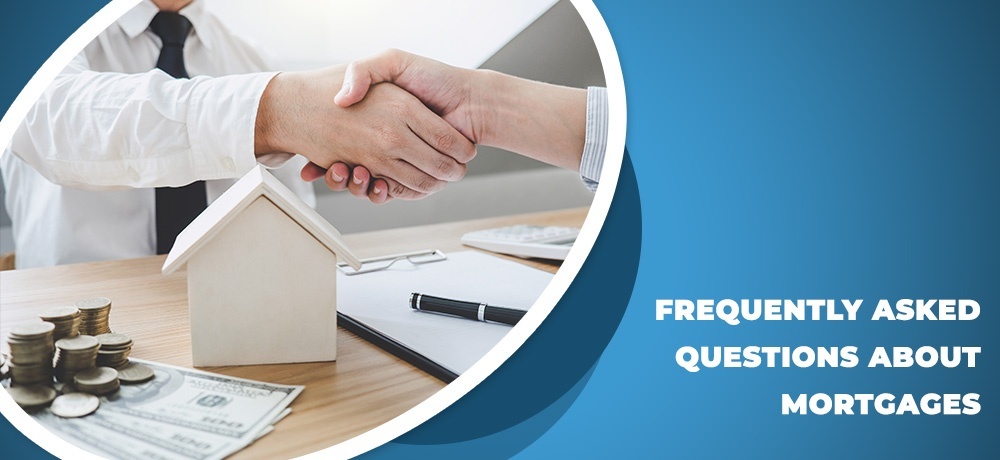Frequently Asked Questions About Mortgages

Mortgages are considered complicated as there are different types of mortgages and several requirements under them to determine whether you are worthy of funding. When it comes to applying for a mortgage, these options and conditions can cause you to have many questions to which the answers are difficult to come by. Fortunately, Mortgages By Erin has recognized this challenge and is happy to arm you with the most accurate information available to some of the most frequently asked questions about mortgages.
1. What is the difference between a fixed or variable-rate mortgage?
A fixed-rate loan has the same interest rate for the duration of the term or borrowing period. Variable-rate mortgages have an interest rate that may be subject to changes and fluctuations over time. Variable rates are offered at either a premium or a discount to the prime rate. Should the prime rate change during the borrowing period, the interest rate would adjust accordingly.
2. What is the difference between an insured mortgage and an uninsured mortgage?
An insured mortgage is offered when you purchase a home with less than 20% down payment. That is, when your down payment is less than 20% of the purchase price, you are required to buy Mortgage Default Insurance. A Mortgage Default Insurance coverage protects the mortgage lender if you don’t make your payments. The fee you pay for mortgage loan insurance is called a premium. The premiums range from 0.6% to 4.50% of your mortgage amount and depend on your down payment size. The bigger the down payment, the less you pay in mortgage default insurance premiums. The premium is rolled into the total mortgage amount.
An uninsured loan, often referred to as a conventional loan, refers to a mortgage that does not carry any form of lender insurance premiums. It’s a loan for no more than 80% of the appraised value or purchase price of a property.
3. What are some acceptable down payment sources?
There are various sources of finance you can use for your down payment. These include:
a. Accumulated savings
b. RRSP/TFSA/investment accounts
c. Sale proceeds from an existing property
d. Divorce settlement
e. Inheritance
f. Money gifted from an immediate family member, in some situations
4. What is a bridge loan?
A bridge loan is a temporary financing option designed to help you as a borrower to “bridge the gap” between the date on which your existing property is sold and your new property is purchased. It allows you to use the equity in your current home to pay the down payment on your next property while you wait for the existing home to sell.
5. What is the difference between a co-signer and a guarantor?
Both a co-signer and a guarantor can help otherwise ineligible borrowers qualify for a mortgage. A co-signer co-owns the home with the individual living on the property and making the mortgage payments. A co-signer’s name will appear on the tile of the property because they legally own the property. They are held accountable for ensuring the payments are made, even if it’s generally understood that they won’t be the ones actually making any of the mortgage payments.
A guarantor has much of the same responsibilities as a co-signer, although not many of the same rights. A guarantor will generally step in when the original applicant is on the verge of qualifying based on their own merits but needs a small boost to satisfy lending criteria. A guarantor’s name does not appear on the title of the property.
6. What is the “Stress-Test”?
Before 2018, all high-ratio insured mortgages were subject to stress-testing, but now the stress test applies to all mortgages. The mortgage stress test requires lenders to ensure a borrower still qualifies for a mortgage and can make their payments at a higher rate than what they will actually pay. To do this, they check your ability to make payments based on the greater of either the Bank of Canada qualifying rate or a rate equivalent to 2% higher than the contractual rate. Credit unions and other lenders that are not federally regulated do not need to use the stress test.
7. How can I pay off my mortgage faster?
Most lenders offer pre-payment privileges, which allow you to pay down your mortgage faster. Typically, you can increase your payments by up to a certain percentage of the original payment amount or make lump sum payments of up to a certain percentage of the original mortgage amount. Any additional payments or lump sum payments you make are applied to the outstanding balance of your loan, hence allowing you to pay it off faster.
Another common method used to pay off your mortgage quicker is to make accelerated weekly or biweekly payments. By making accelerated payments, you are, in essence, making one more payment per year (compared to monthly or non-accelerated payments), which will save you money on interest and reduce your amortization period.
8. How can I boost my credit score?
There are three main ways to increase your credit score; they are:
a. Make all your payments on time
b. Have at least two active trade lines (credit cards, lines of credit)
c. Keep balances below 40% of the limit
If you have any more questions about mortgages, get in touch with Mortgages By Erin. I am a mortgage broker in Toronto, ON, and I have successfully helped hundreds of people obtain the home of their dreams in the last ten years of my career. I am knowledgeable of the latest developments in the mortgage industry and am well connected with several lenders. This gives me the potential to help out just about any borrower looking to purchase a house. I also help my clients fix their credit scores and recover from their debt to afford the property they desire. To learn more about how we can help you, please click here or contact us by clicking here.